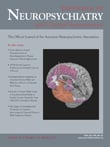Case Report
A 64-year-old woman with DSM-IV schizophrenia for 12 years presented to us with a relapse. She was variously treated with trifluoperazine, 15 mg/day, chlorpromazine, 500 mg/day, and thioridazine, 300 mg/day, before presenting to us, but continued to exhibit relapses. After choosing to remain off her medications for 5 months, she had a relapse and risperidone, 2 mg/day, was started; this dosage was increased to 4 mg/day along with trifluoperazine, 2 mg/day, over a period of 4 weeks. She remained stable on this regimen for 3 months. At this time, the patient had an episode of viral fever and hence stopped these medications abruptly, on her own. Within 36 hours, she developed severe oro-bucco-lingual dyskinetic movements with involuntary movements of respiratory muscles, grunting and irregular breathing pattern, as if she was breathless after exercise. She had difficulty maintaining a sitting posture due to hyperventilation. Movements were involuntary, and distraction would not alter their intensity. No abnormal movements were noticed during sleep or in any other part of her body. Clinical examination did not reveal any contributory findings, and all routine investigations, including a chest X-ray, were normal. She scored 10 on the Abnormal Involuntary Movement Scale (AIMS). Separate trials of trihexyphenidyl, 4 mg/day, clonazepam, 2 mg/day, and clozapine, 150 mg for 7 days, failed.
Risperidone, 2 mg/day, was restarted and increased to 4 mg/day over 10 days; she exhibited a dramatic response after 4 days of therapy, and her involuntary movements disappeared. At the end of 12 weeks of risperidone treatment, 4 mg/day, she developed dyskinetic movements of both hands, but with more on the right suggesting tardive dyskinesia. Risperidone was withdrawn, and, as a result, the patient again exhibited (withdrawal) respiratory dyskinesia. Her psychosis also relapsed. Hence, clozapine, 25 mg/day, was started as we assumed it would be beneficial in tardive dyskinesia, respiratory dyskinesia, and psychosis. The dosage was increased to 250 mg/day over 3 weeks. After 6 weeks of clozapine therapy, she showed marked improvements in all her symptoms with complete disappearance of the respiratory dyskinesia. The probability of an adverse drug reaction was assessed using the Naranjo Probability Scale which indicated a possible association between risperidone withdrawal and respiratory dyskinesia.
Discussion
We have come across only three case reports of possible withdrawal-emergent (respiratory) dyskinesia associated with risperidone.
1 –
3 However, to the best of our knowledge, the use of clozapine in cases with respiratory dyskinesia has not been reported in the literature. Therefore, this is probably the first case report where clozapine had been used successfully in neuroleptic withdrawal-induced respiratory dyskinesia.
It is not advisable to administer the same neuroleptic again, as the occurrence of withdrawal dyskinesia may predict vulnerability to the development of tardive dyskinesia.
4 Nevertheless, clozapine, with low affinity for the striatal D2 receptors and to the inhibition of presynaptic 5HT-2A receptors together with its anticholinergic activity, may be less likely to induce extrapyramidal side effects.
4
